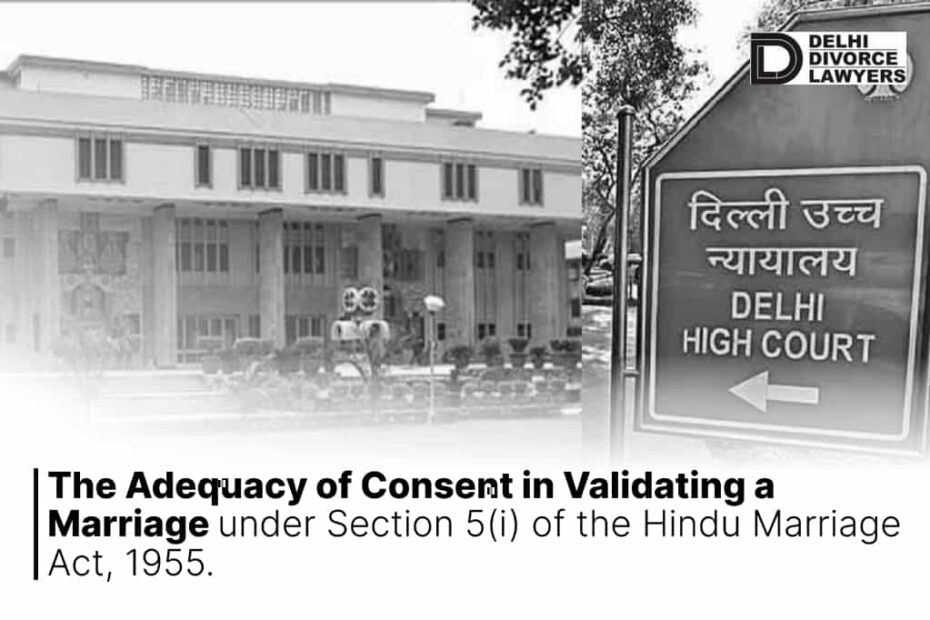“The very fact that the wife had not only claimed but also accepted pendente lite maintenance during the appeal from the first husband fortifies that the marriage was not finally dissolved.”
Delhi High Court\’s Determination on Marriage Legitimacy:
In the present litigation, an appeal was initiated under Section 19 of the Family Courts Act, 1984, with the objective of challenging a preceding judgment issued on November 29, 2017. The aforesaid judgment pronounced the marriage between the litigants null and void under the provisions of Section 11 of the Hindu Marriage Act, 1955 (HMA). The core premise of the court\’s pronouncement was that the act of providing consent, in isolation, is inadequate to confer legal validity upon a marriage when it transgresses the delineated requirements within Section 5(i) of the HMA. This deficiency in consent is accentuated particularly in instances where a legal impediment exists to contracting a second marriage. The court also underscored the respondent-wife\’s acceptance of interim maintenance during the pendency of an appeal filed by her former spouse, which, in the court\’s view, signified the unresolved dissolution of her prior matrimonial alliance. Consequently, the court concurred with the decision of the Family Court to declare the marriage as null and void under the provisions of the HMA, and correspondingly, the court dismissed the appeal.
Background of the Case:
The parties to the case entered into the institution of marriage on April 28, 2009, in accordance with Hindu traditions. Of particular note is the fact that the appellant-wife had previously contracted a matrimonial union, which was formally dissolved on March 31, 2008. Nonetheless, her former spouse initiated an appeal contesting the divorce decree. The appellant-wife acquired knowledge of this pending appeal in December 2008, and yet the appeal was not withdrawn until more than four years later, on July 22, 2012.
The disintegration of the second marital bond between the parties was catalyzed by disharmony in their relationship, leading the husband to institute legal proceedings under the purview of Section 11 of the HMA. In this legal action, the husband contended that the initial marriage of the wife remained legally subsisting due to the pendency of the appeal, thereby rendering the second marriage unlawful. In its judgment, dated November 29, 2017, the Family Court ruled that, considering the ongoing appeal related to the wife\’s initial divorce decree at the time of her second marriage, the latter adhered to the legal stipulations enshrined in the HMA. Consequently, the court declared the marriage null and void in accordance with the terms of Section 11 of the HMA.
Subsequently, the appellant-wife lodged the present appeal.
Legal Analysis and Court\’s Decision:
The court acknowledged the admission made by the appellant-wife during her testimony, wherein she affirmed her awareness of the pending appeal prior to her second marriage, consummated on April 28, 2009. The wife maintained that the husband was similarly apprised of the appeal\’s status before their marital contract, and he had assured her that the appeal\’s pendency would not impede the solemnization of their matrimonial alliance.
Taking into account the statutory constraints encapsulated in Section 23 of the HMA, which operate to preclude a party from deriving advantage from their own malfeasance, the court undertook a meticulous examination to determine whether the mutual consent of the parties could supersede the legal impediment in question. In elucidating the legal landscape, the court expounded that when the statutory provisions of the HMA, specifically Section 5(i), are transgressed, the resultant effect is the nullification of the marriage, as per the mandate of Section 11. The court unequivocally underscored that in circumstances characterized by the presence of a legal prohibition against a second marriage, the amicable consent of the parties does not possess the capacity to infuse legality into a marriage that contravenes the stipulated conditions enumerated in Section 5(i) of the HMA.
The court further invoked a relevant legal precedent set forth in the matter of Chandra Mohini Srivastava v. Avinash Prasad Srivastava, reported in AIR 1967 SC 581. This authoritative precedent delineated that, in consonance with Section 15 of the HMA, a spouse is permitted to contract a lawful remarriage solely upon the elapse of the appeal-filing period or upon the dismissal of the appeal itself. In the present case, the parties entered into their marital bond while the appeal was still pending, a factual circumstance acknowledged by both parties. Given that the conclusiveness of the dissolution of the initial marriage was not established at the time of the second marriage, in harmony with the prescripts of Section 15 of the HMA, the court held that the marriage, solemnized on April 28, 2009, contravened the dictates of Section 5(i) of the HMA.
The court also accentuated the fact that the appellant-wife had actively pursued and received interim maintenance from her former husband during the pendency of the appeal. This additional element bolstered the court\’s stance that the dissolution of the first marriage had not been definitively adjudicated.
In sum, the court concurred with the Family Court\’s decision that the marriage was correctly annulled under the aegis of the HMA, and consequently, the court dismissed the appeal.

